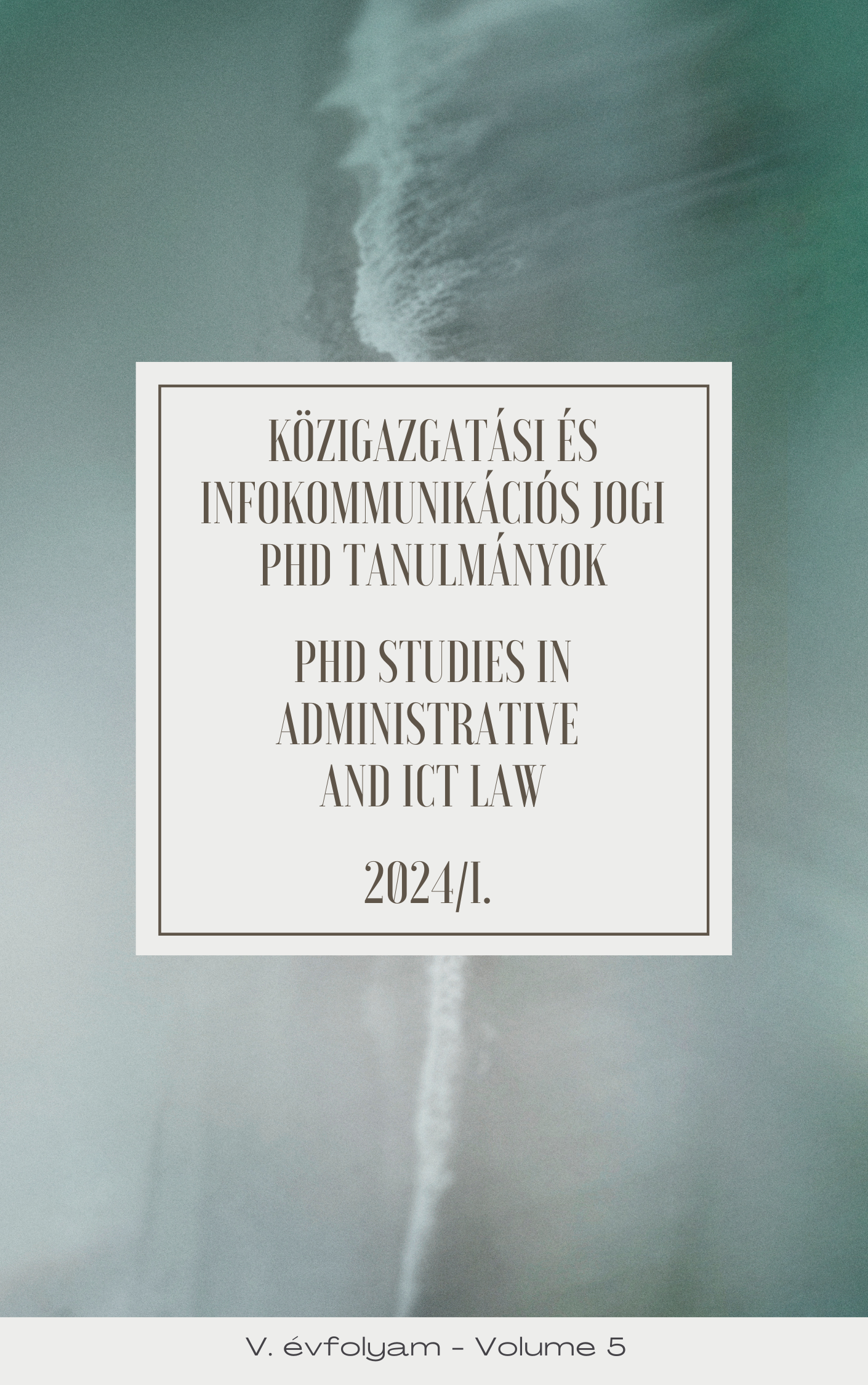Az adathasznosítás adatfogalmának meghatározási lehetőségei
DOI:
https://doi.org/10.47272/KIKPhD.2024.1.2Kulcsszavak:
Adat, Adathasznosítás, DIKW piramisAbsztrakt
Az adatok hasznosítása egyre inkább előtérbe kerül, mind technológiai, mind jogi kutatási szempontból. Jelen tanulmány az adathasznosítás fogalompárjának első elemének vizsgálatát tűzi ki célul, a jelenleg fennálló hézagos és sokszor félreértésekre alapot adó állapot megszüntetése érdekében. Ennek érdekében a meglévő szakirodalom és fellelhető gyakorlat alapján az adatfogalom több aspektusból kerül megvilágításra, kiemelten a hasznosítással kapcsolatos későbbi kutatások megkönnyítése érdekében.
Letöltések
Hivatkozások
Adanma Cecilia Eberendu: Unstructured Data: an overview of the data of Big Data. International Journal of Emerging Trends & Technology in Computer Science 38(1), 46-50. https://doi.org/10.14445/22312803/IJCTT-V38P109
Alexandra Anghel, Elena Novacescu, Madalina Cuc: Big Data and Its Secrets: Types of Big Data. Romanian Intelligence Studies Review, 2022/27. 54-73 o.
Algorithm Watch: Automating Society Report 2020. https://automatingsociety.algorithmwatch.org/report2020/switzerland/switzerland-story/ (2024.04.30.)
Amy Affelt: Big Data, Big Opportunity. Australian Law Librarian, 21(2), 2013. 78-89. o.
Anya Bernstein: What Counts as Data?. Brooklyn Law Review, 86(2), 2021. 435-460. o.
Balogh Zsolt György: Jogi Informatika. Budapest-Pécs, Dialóg campus Kiadó, 1998. 17. o.
Charles I. Jones, Christopher Tonetti: Nonrivalry and the Economics of Data. American Economic Review 110(9), 2020. 2819–2858. o. https://doi.org/10.1257/aer.20191330
Chase Bibby, Jonathan Gordon, Gustavo Schuler, Eli Stein:The big reset: Data-driven marketing in the next normal”, McKinsey & Company, 2021. https://www.mckinsey.com/capabilities/growth-marketing-and-sales/our-insights/the-big-reset-data-driven-marketing-in-the-next-normal (2024.04.30.)
Christian Hänig, Martin Schierle, Daniel Trabold: Benefits of Unstructured Data for Industrial Quality Analysis. In: Sio-long Ao, Mahyar Amouzegar, Burghard Rieger (Eds.): Intelligent Automation and Systems Engineering. Lecture Notes in Electrical Engineering, vol 103. New York, Springer. https://doi.org/10.1007/978-1-4614-0373-9_20
Clare Southerton: Datafication. In: Laurie Schintler, Connie McNeely (Szerk.): Encyclopedia of Big Data. New York, Springer, 2020. 1-4 o. https://doi.org/10.1007/978-3-319-32001-4_332-1
Corwin D. Edward: The Meaning Of Quality. Quality Progress, 1(10), 1968. 36-39 o.
Darin K. Fox: What Is Web 2.0. AALL Spectrum 13(9), 2009. 2.o.
David Boddy, Albert Boonstra, Graham Kennedy: Managing Information Systems: Strategy and Organisation. London, Pearson Education, 2008.
Hohmann, Balázs: Interpretation the Concept of Transparency in the Strategic and Legislative Documents of Major Intergovernmental Organizations. Közigazgatási és Infokommunikációs Jogi PhD Tanulmányok 2(1), 2021, 48-56. o. https://doi.org/10.47272/KIKPhD.2021.1.4
IBM: What is strong AI?. https://www.ibm.com/topics/strong-ai (2024.04.30.)
Jennifer Rowley: The wisdom hierarchy: representations of the DIKW hierarchy. Journal of Information Science, 33(2), 163-180. o. https://doi.org/10.1177/0165551506070706
Jingran Wang, et. al.: Overview of Data Quality: Examining the Dimensions, Antecedents, and Impacts of Data Quality. Journal of the Knowledge Economy, 2023. https://doi.org/10.1007/s13132-022-01096-6
John D. Trimmer: The present situation in quantum mechanics: a translation of schrödinger's cat paradox paper. Proceedings of the American Philosophical Society, 124(5), 323-338. o.
Juan O. Freuler: Datafication, Identity, and the Reorganization of the Category Individual. Temple Law Review 95(4), 2023. 378 o.
Julia Carrie Wong: The Cambridge Analytica scandal changed the world – but it didn't change Facebook. The Guardian, 2019. https://www.theguardian.com/technology/2019/mar/17/the-cambridge-analytica-scandal-changed-the-world-but-it-didnt-change-facebook (2024.04.30.)
Jyoti Narayan, Krystal Hu, Martin Coulter, Supantha Mukherjee: Elon Musk and others urge AI pause, citing 'risks to society'. Reuters, 2023. https://www.reuters.com/technology/musk-experts-urge-pause-training-ai-systems-that-can-outperform-gpt-4-2023-03-29/ (2024.04.30.)
Kengyel Miklós: Magyar Polgári Eljárásjog. Budapest, Osiris Kiadó, 2014. 287 o.
Kenneth C. Laudon, Jane P. Laudon: Management Information Systems: Managing the Digital Firm, Global Edition. London, Pearson Higher Ed, 2021.
Kyu Yub Lee, Hyun Park: Data, Privacy, and Artificial Intelligence. SSRN Electronic Journal, 2022. DOI: https://doi.org/10.2139/ssrn.4246578
Larisa-Antonia Capisizu: Legal Perspectives on the Internet of Things. In: Conferinta Internationala de Drept, Studii Europene si Relatii Internationale. Bucharest, Titu Maiorescu University, 2018. 523. o.
Leonard M. Jessup, Joseph S. Valacich: Information systems today: managing in the digital world. London, Pearson Prentice Hall, 2008.
Maryam Farboodi, Laura Veldkamp: A Model of the Data Economy. NBER Working Paper No. 28427, 2021. https://doi.org/10.3386/w28427
Paul Adrien, Maurice Dirac: The Principles of Quantum Mechanics. Oxford, Clarendon Press, 1981. 314. o.
Rahul Rao: What happens if AI grows smarter than humans? The answer worries scientists. Popular Science. https://www.popsci.com/science/ai-singularity/ (2024.04.30.)
Rob Kitchin: The Data Revolution: Big Data, Open Data, Data Infrastructures & Their Consequences. New York, SAGE Publications, 2014. 1-26. o. https://doi.org/10.4135/9781473909472
SARTORIUS: How Manufacturers Are Using Big Data Analytics to Improve Processes. 2019. https://www.sartorius.com/en/knowledge/science-snippets/how-manufacturers-are-using-big-data-analytics-to-improve-processes-507146 (2024.04.30.)
Saša Baškarada, Andy Koronios: Data, Information, Knowledge, Wisdom (DIKW): A Semiotic Theoretical and Empirical Exploration of the Hierarchy and its Quality Dimension. Australasian Journal of Information Systems, 18(1), 2013. 5-24. o. https://doi.org/10.3127/ajis.v18i1.748
Sastry Chilukuri: The role of big data in medicine. McKinsey & Company, 2015. https://www.mckinsey.com/industries/life-sciences/our-insights/the-role-of-big-data-in-medicine#/ (2024.04.30.)
The Writing Telegraph. Scientific American, 11(13), 1879. 196. o. https://doi.org/10.1038/scientificamerican03291879-196a
Thomas H. Cormen, Charles E. Leiserson, Ronald L. Rivest, Clifford Stein: Introduction to Algorithms. Third Edition. Cambridge, Massachusetts, London, England, The MIT Press, 2009. 5. o.
Todd Groff, Thomas Jones: Introduction to Knowledge Management. London, Routledge, 2003.
Trevor Haynes: Dopamine, Smartphones & You: A battle for your time. Harvard University, Science in the News. https://sitn.hms.harvard.edu/flash/2018/dopamine-smartphones-battle-time/ (2024.04.30.)
Ulises A. Mejias, Nick Couldry: Datafication. Internet Policy Review Journal On Internet Regulation, 8(4), 2019. https://doi.org/10.14763/2019.4.1428
Visegrády Antal: Jogi alaptan. Pécs, Janus Pannonius Tudományegyetem, Állam- és Jogtudományi Kar, 1996. 44. o.
W.K. Jenkins: Signal Processing, Analog. In: Robert A. Meyers (Eds.): Encyclopedia of Physical Science and Technology (Third Edition). Cambridge, Academic Press, 2003. 711-735. o. https://doi.org/10.1016/B0-12-227410-5/00686-4
Ződi Zsolt: Platformok, robotok és a jog. Budapest, Gondolat Kiadó, 2018. 76. o.
Downloads
Megjelent
Hogyan kell idézni
Folyóirat szám
Rovat
License
Copyright (c) 2024 Közigazgatási és Infokommunikációs Jogi PhD Tanulmányok

This work is licensed under a Creative Commons Attribution-NonCommercial-ShareAlike 4.0 International License.
A cikk felhasználási jogaira bármely harmadik fél számára az első közzétételt követően a Creative Commons Attribution-NonCommercial-ShareAlike 4.0 (CC-BY-NC-SA 4.0) licenc feltételek az irányadók.














